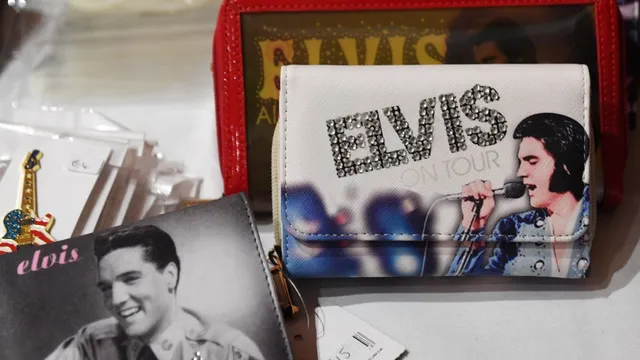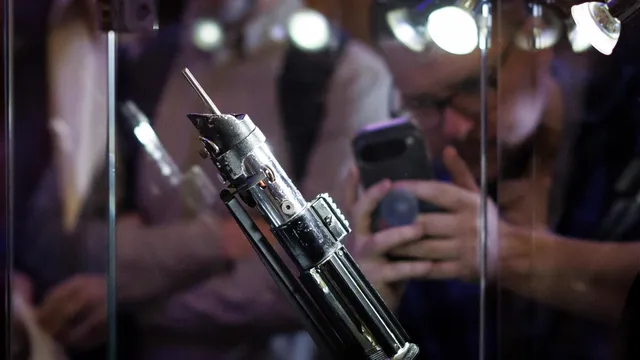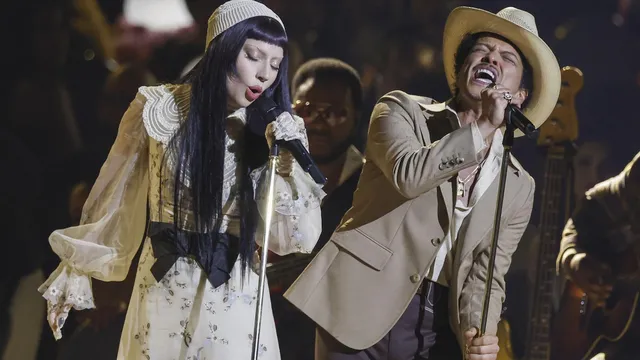The public perception of Elvis Presley's manager, Colonel Tom Parker, has long positioned him as synonymous with the duplicitous representation of artists, where profit prevails over art, and the artist always loses out.
It is understandable why. Born Andreas Cornelis van Kuyck, even the name Colonel Tom Parker was invented and fabricated. Therefore, according to assumptions, so was he himself. But in "The Colonel and the King," a new biography of Parker, Peter Guralnick dispels many of these assumptions to present a much more nuanced portrait of a highly moral man, The Guardian reported.
Guralnick knows the intricacies of this story better than anyone else, except perhaps the colonel himself and Presley, having written two voluminous biographies of the singer (Last Train to Memphis in 1994 and Careless Love in 1999). His biography of Parker is no less voluminous, at nearly 600 pages.
It is divided into two parts: the first half is a biography, and the second half is a selected reprinted version of some of the tens of thousands of letters, notes, and telegrams that Parker wrote and archived during his career. Guralnik was given full access to all of this correspondence and was able to see the inner workings and strategic thinking of the man behind the public myth.
While researching the book, Guralnik reevaluated everything he had previously thought about Parker in order to give him "his rightful place in history," expressing the difficult balance that a biographer must maintain. "I didn't want to justify him," says the writer, "nor did I want to condemn him."
Parker was born in Breda, the Netherlands, in 1909 and arrived in America illegally in the 1920s without documents. He then rewrote his own story, claiming to have been born in Huntington, West Virginia. He enlisted in the US Army in 1929, then worked in carnivals before becoming a manager for musical performers such as Hank Snow, Gene Austin, and Eddie Arnold. His breakthrough came when he saw Presley at the Louisiana Hayride in January 1955 and immediately realized that he would be a new kind of star and that he needed to guide him in that direction.
Parker officially took over Presley's management in March 1956 and represented a new generation of managers who valued art over commerce. His fate and Presley's, their successes and the tension between them remained intertwined until Presley's death in 1977.
"He's a completely different person from what people think he is," says Guralnik, who met Parker in 1988 and corresponded with him regularly. "He was brilliant and funny," he says of Parker's playful self-mythologizing, but also his cunning self-protective behavior. "He had the means to disarm me or keep me at a distance. He was always five steps ahead."
Parker fully understood that his role was to make the one he called "the boy" a star, while at the same time acting as a barrier to his record company, his agents, and Hollywood in their ambition to "soften Elvis." Presley was his own creative arbiter. Parker rarely gave advice on stage performance and never gave advice on song selection or recording. "Elvis was his artist. He embraced the music because he embraced the artist."
Artist management often involves a certain degree of stage direction. Brian Epstein dressed the Beatles in suits. Andrew Loog Oldham tousled the Rolling Stones' hair. Malcolm McLaren, at least in his mind, was the puppet master of the Sex Pistols. Parker, however, rarely interfered. "Elvis was a person in whom Parker saw potential for endless growth," Guralnik asserts. Parker rarely lost his temper and worked 16-18 hours a day, seven days a week, for Elvis. His dedication was complete.
I ask Guralnik whether he thinks Parker's past in the carnival (historically, people from it were viewed with suspicion as wandering outsiders) or as an immigrant was a factor in the public's prejudiced attitude toward him. The writer suggests that Parker actually took advantage of this rather than being intimidated by it. "No one was more American or more independent than Tom Parker," the writer asserts.
One of Elvis's performances in Las Vegas was renegotiated in a hotel café. Parker was asked to consider some "other extras" (an illegal deal), but he categorically refused. "Everything is on the table," Parker insisted. "We don't do business that way."
The negative opinion of the manager only formed after Elvis' death. From the mid-1950s to the mid-1970s, Parker was "almost universally" respected in the music and film industry, Guralnik claims. "Over the years, I've talked to many people who worked with Parker and who said you could trust him implicitly," he shares.
Parker believed that all business deals should be based on unshakeable morality. "He taught Hank Sapperstein (who handled Presley's merchandise) about business ethics," Guralnik says, pointing to letters sent by Parker instructing Sapperstein on how to treat staff and manufacturers fairly.
Parker managed to convince RCA to pay an inflated price to buy Presley out of his contract with Sun Records in 1955, paying $35,000 (plus thousands more in unpaid royalties), while the more established artist Frankie Lane was bought out of his contract with Columbia for $25,000 in 1951. He also renegotiated Presley's contract with RCA as soon as the hits started rolling in, significantly improving his terms after only 11 months.
Realizing Presley's irreparable expenses and his enormous tax burden (both considered paying high taxes patriotic), Parker opened an emergency bank account with $1 million in case Presley got into trouble. He also regularly helped Presley's friends from the "Memphis Mafia," quietly stepping in to fix their messes so that the star could avoid negative consequences.
Parker, however, was addicted to gambling and lost $800,000 in one session in Vegas. Both shared a love of spending. "Elvis wasn't interested in accumulating money — he just spent it," insists Guralnik. "And the Colonel wasn't interested in accumulating money. He lost it at the gambling table."
Parker remained loyal to Presley long after his death, even though his family removed him from the business in 1983. After Presley, he did not work with other artists, although he did advise Celine Dion at the beginning of her career. It wasn't that he felt anachronistic, but rather that he believed he had achieved everything a manager could achieve with the biggest star in the world. For Parker, any other artist or deal would have been less significant.
Guralnik says, "The letters gave me an opportunity to understand what was behind the public statements," and his book is more of a timely reassessment of the manager's reputation than an uncritical whitewashing of his image.
Perhaps the biggest myth about Parker is that he forced Presley to participate in mediocre Hollywood films as a substitute for international tours because he was afraid of being deported. Guralnik, however, suggests that he could easily have obtained an American passport through his marriage to an American citizen. In addition, he was a close friend of President Lyndon Johnson. Why he did not apply for one remains a mystery.
Parker's letters show that he seriously considered organizing a world tour for Presley by 1960, and in 1973 he explored the possibility of a tour in Japan. Guralnik claims that the real reason Elvis never performed outside the US was not because of Parker, but because of the performer himself. The star never showed much interest, but the main reason was his addiction to amphetamines and other drugs, as well as his tendency to carry weapons, which made crossing borders impossible for him. Parker expressed concern about providing adequate security for Presley. "He talked about security to protect Elvis from arrest. Who would carry the drugs that Elvis carried with him everywhere? Who would carry the guns?"
Presley and the colonel were intricately intertwined, but Guralnik found letters in which Parker admitted that he was never part of Presley's social circle, but seemed comfortable with that. They almost split up in 1973 after a scandal in Vegas, but Parker's letters from that time calmly outline how they could have ended their partnership. "I have no hard feelings," he wrote, "but I'm not a puppet on a string either."
It didn't come to that because their mutual dependence was as great as their mutual admiration. In a rare letter from Presley upon signing the original RCA contract, he told Parker, "I love you like a father." But it was more than a father-son relationship. According to Guralnick, there was a deeper psychological connection.
"I began to see the relationship between Parker and Elvis as a kind of shared tragedy," says the writer. "Each of them had their own addictions. Parker was a man who was so vulnerable, not only at that time but also from childhood in ways we will never understand, suffering from some form of trauma, a man who really couldn't stand being touched by someone he didn't know."
He was "an introvert who had to learn to act like an extrovert in order to survive," according to Loann, his second wife.
Parker died in 1997, taking some of his secrets to the grave, but Guralnik's book offers the most complete, complex, and myth-busting understanding of him that we will ever get. | BGNES

 Breaking news
Breaking news
 Europe
Europe
 Bulgaria
Bulgaria







